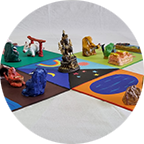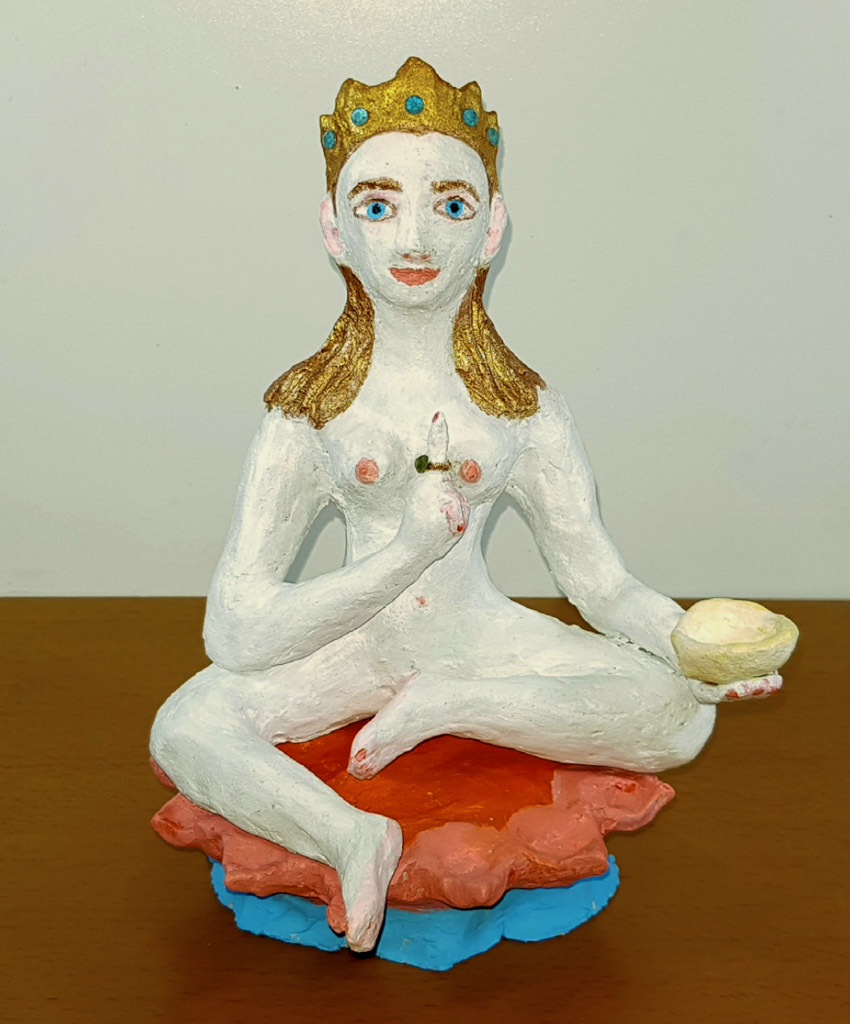Retelling: Vova Pyatsky and Smadar Pyatsky (based on the translations of the suttas published on Theravada.ru and SuttaCentral.net)
Russian Version: Махадуккхакхандха сутта, Большая беседа о скоплении страданий, Мадджхима Никая 13 | Три Ваджры
Translation to English: Roni Sherman and Marina Sherman
Once, disciples asked the Buddha what distinguished His Teaching from the teachings of other teachers who taught detachment from sensual pleasure, cessation of dependence on the objects of the senses, and attainment of a state beyond sensual perception? The Buddha explained to them that the peculiarity of His Teaching is that it completely exhausts the ignorance concerning these phenomena, and explained how final understanding comes.
Detachment from Sensual Pleasure
The five threads: sight, hearing, smell, taste and touch entangle the mind. These threads cause ending up in dependence on what is pleasant, while dependence on what is pleasant encourages beings to risk their health and life for the sake of sensual pleasure and wealth. Beings suffer from the collapse of hopes, experience fear of loss of possessions, demonstrate hostility and cruelty towards other beings — this accumulation, mountain of suffering arises because the five threads attract the mind to sensual pleasure.
Knowing of the danger of craving for what is pleasant, the wise distance themselves from sensual pleasure. This detachment is attained only with the cessation of desire and the ternary thirst and with nothing else. The Noble Eightfold Path leads to the cessation of desire and thirst (about the Noble Eightfold Path Sammaditthi, Majjhima Nikaya 9).
Cessation of Dependence on the Objects of the Senses
The object of the senses most desired by a man— is a beautiful woman, while the object of the senses most desired by a woman — is a beautiful man. But beauty is impermanent. Beings grow old, become covered with wrinkles, hunched, their teeth crack and fall out. Beings get sick, lose strength, lie in filth, become repulsive. Beings die, their bodies decompose, revealing their impurity. Thus even the most pleasant object of the senses contains an accumulation, a mountain of suffering within itself. The cessation of desire and thirst for possession is the cessation of dependence. And only the Noble Eightfold Path ends desire and thirst of possession.
A state beyond sensual perception
A state beyond sensual perception is appealing because of the disappearance of bodily suffering. The four dhyanas — the four brilliant experiences of concentration — lead to this state.
1. Concentration with effort in which the mind is directed to an object and is held on it — having ceased wandering after the senses, the meditator will not experience hostility towards other beings.
2. Concentration without effort in which the mind maintains concentration in the heart through rapture — experiencing inner absorption, the meditator does not experience hostility
3. Concentration without effort and without rapture in which the mind maintains concentration through relaxation — experiencing a comfortable, tranquil state, the meditator does not experience hostility.
4. Concentration without effort, without rapture and without reliance on bodily sensations in which the mind maintains concentration through non-involvement — without making out thoughts and notions, abiding in their own volition, the meditator is free of hostility.
These superior forms of concentration become perfect only by virtue of following the Noble Eightfold Path. That is how to overcome the accumulation, heap of suffering.
Author
Retelling: Vova Pyatsky and Smadar Pyatsky (based on the translations of the suttas published on Theravada.ru and SuttaCentral.net)
Russian Version: Махадуккхакхандха сутта, Большая беседа о скоплении страданий, Мадджхима Никая 13 | Три Ваджры
Translation to English: Roni Sherman and Marina Sherman
Once, disciples asked the Buddha what distinguished His Teaching from the teachings of other teachers who taught detachment from sensual pleasure, cessation of dependence on the objects of the senses, and attainment of a state beyond sensual perception? The Buddha explained to them that the peculiarity of His Teaching is that it completely exhausts the ignorance concerning these phenomena, and explained how final understanding comes.
Detachment from Sensual Pleasure
The five threads: sight, hearing, smell, taste and touch entangle the mind. These threads cause ending up in dependence on what is pleasant, while dependence on what is pleasant encourages beings to risk their health and life for the sake of sensual pleasure and wealth. Beings suffer from the collapse of hopes, experience fear of loss of possessions, demonstrate hostility and cruelty towards other beings — this accumulation, mountain of suffering arises because the five threads attract the mind to sensual pleasure.
Knowing of the danger of craving for what is pleasant, the wise distance themselves from sensual pleasure. This detachment is attained only with the cessation of desire and the ternary thirst and with nothing else. The Noble Eightfold Path leads to the cessation of desire and thirst (about the Noble Eightfold Path Sammaditthi, Majjhima Nikaya 9).
Cessation of Dependence on the Objects of the Senses
The object of the senses most desired by a man— is a beautiful woman, while the object of the senses most desired by a woman — is a beautiful man. But beauty is impermanent. Beings grow old, become covered with wrinkles, hunched, their teeth crack and fall out. Beings get sick, lose strength, lie in filth, become repulsive. Beings die, their bodies decompose, revealing their impurity. Thus even the most pleasant object of the senses contains an accumulation, a mountain of suffering within itself. The cessation of desire and thirst for possession is the cessation of dependence. And only the Noble Eightfold Path ends desire and thirst of possession.
A state beyond sensual perception
A state beyond sensual perception is appealing because of the disappearance of bodily suffering. The four dhyanas — the four brilliant experiences of concentration — lead to this state.
1. Concentration with effort in which the mind is directed to an object and is held on it — having ceased wandering after the senses, the meditator will not experience hostility towards other beings.
2. Concentration without effort in which the mind maintains concentration in the heart through rapture — experiencing inner absorption, the meditator does not experience hostility
3. Concentration without effort and without rapture in which the mind maintains concentration through relaxation — experiencing a comfortable, tranquil state, the meditator does not experience hostility.
4. Concentration without effort, without rapture and without reliance on bodily sensations in which the mind maintains concentration through non-involvement — without making out thoughts and notions, abiding in their own volition, the meditator is free of hostility.
These superior forms of concentration become perfect only by virtue of following the Noble Eightfold Path. That is how to overcome the accumulation, heap of suffering.

